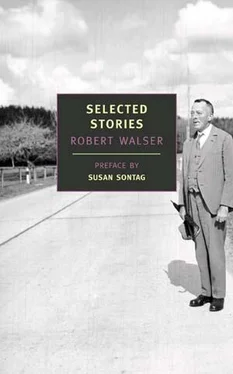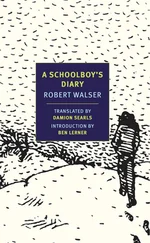The only period missing from the selection is the earliest one, about 1898–1904. Some of Fritz Kochers Aufsätze might have been included, also an early miniature play, or “dramolet”—Walter Benjamin thought Schneewitzchen profound and exemplary. At least in “Helbling” and “The Little Berliner” the reader will find amplified versions of Fritz Kocher, the impish schoolboy soliloquist who, not much later, becomes the Kommis, or clerk, as underdog, whose character as Walser portrayed him captured Kafka’s imagination.
Walser did not stop writing when he voluntarily entered the Waldau mental hospital in Berne in 1929. It was only when he was forcibly transferred to Herisau in Appenzell, in 1933, that he gave up, or switched, one might say, from being an incalculable alien to being an official lunatic. His last “sane” book publication was Die Rose, in 1925; but throughout the 1920s he was writing prolifically, at times frenetically, and always with gusto, in his extraordinary solitude. To Jochen Greven we are indebted for the recovery and deciphering of hundreds of prose miniatures from that period. These now appear, together with pieces that were published in newspapers and journals, in the four posthumous volumes, Festzug, Phantasieren, Olympia, and Der Europäer. From these books I have chosen several texts; datings come from the same source.
To some extent Robert Walser was, in Artaud’s phrase, “suicided by society.” Certainly he was one of the great European artists in language, since Christopher Smart, to have risked all rather than compromise, and to have been broken eventually, like Hölderlin, perhaps, or Nerval, by certain neuro-chemical effects of a demonic anguish. (Yet, in his madness, Walser was surprisingly sane. To Carl Seelig, who became his legal guardian in the late 1930s, he once said, when asked if he was writing anything: “I am not here to write, but to be mad.”) Altogether, one reads Walser for his blithe difference from colleagues in any age or any condition — for his perfect and serene oddity. He composes a language that is prodigiously his own, even when the words in their structures tally with Swiss German and High German. The translators have done their best. Speaking for myself, I have taken few liberties and those only to mark the whirling track of Walser’s dance more clearly in English than might otherwise have been the case (also perhaps more quaintly than some solemn readers might relish).
The Walk and Other Stories (1957) has been taken up into the present book, with some revisions. Acknowledgment is made to John Calder for permission to reprint the four texts in that book. Acknowledgment is made also to the little magazines in which Tom Whalen, having discovered Walser in the forests of Arkansas and made of him, later, a sort of hero for some very gifted young writers in New Orleans, placed his collaborative translations: Barataria, Chowder Review, Lowlands Review, The Paris Review, Writ; to Delos, in which Harriett Watts’s translation first appeared (1968); and to Texas Quarterly, in which “Helbling’s Story” and “Masters and Workers” appeared (1964). Walser’s third novel, Jakob von Gunten (University of Texas Press, 1969), might appeal to readers who have enjoyed this selection. For a brilliant, imaginative reconstruction of Robert Walser, as a spirit touching fingertips with Erik Satie, the reader is referred to Guy Davenport’s “A Field of Snow on a Slope of the Rosenberg,” in his book Da Vinci’s Bicycle.
Therese Breitbach, with whom Walser exchanged letters between 1925 and 1932, was seventeen and living in Germany when she first wrote to Walser; they never met.












